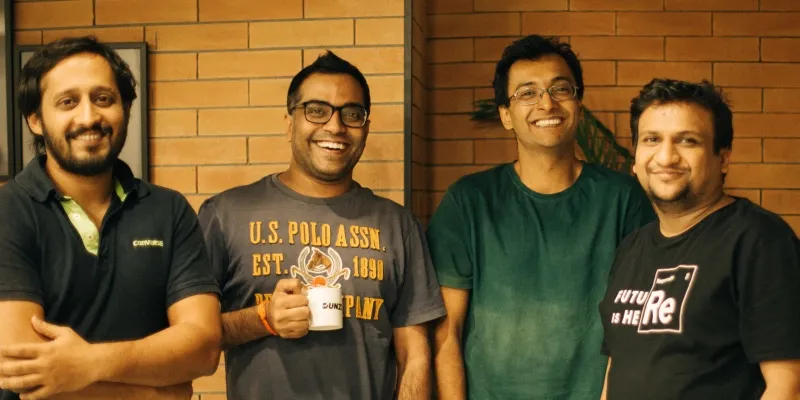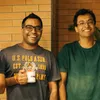[The Turning Point] From starting as a WhatsApp service to getting Google to make its first direct investment in India - the Dunzo journey
The Turning Point is a series of short articles that focuses on the moment when an entrepreneur hit upon their winning idea. Today we look at hyperlocal logistics startup Dunzo, which has Google making its first direct investment in a startup.
It has been known to deliver anything and everything - from cow dung to breast milk. However, Bengaluru-based hyperlocal delivery app Dunzo started its journey as a WhatsApp service.
Kabeer Biswas was sitting at a restaurant in Bengaluru when he had a thought. “How nice it would be if there was someone who could complete your list of tasks for you. Just tell someone what you need finished and it is done.”

Founders of Dunzo - Ankur Aggarwal, Mukund Jha, Kabeer Biswas, and Dalvir Suri
That was his eureka moment and led to the WhatsApp version of Dunzo. Kabeer was joined by Ankur Aggarwal, Dalvir Suri, and Mukund Jha as co-founders.
Kabeer bounced his idea off a friend and started running tasks like picking laundry, pick and drop, and buying on WhatsApp for over a year. Over this period of completing these tasks, he realised that everything was already available thanks to a great GPS system.
Today, 80 percent of Dunzo’s tasks are completely automated and run without any human intervention. This is what has enabled them to scale.
Dunzo does over two million deliveries month on month, with an average delivery taking 28 minutes across nine cities. The Bengaluru-based startup also operates bike taxi services in Gurugram, Noida, and Hyderabad.
Google, made its first direct investment in the startup in December 2017, and since then there has been no looking back. It also raised $45 million in a fresh round from Lightbox Ventures, Google, 3L Capital, and STIC Investment & STIC Ventures. In the last 18 months, Dunzo claims to have shown over 40X growth.
“Running tasks like picking laundry and doing pickups and drops for over a year helped me to really understand the time it takes. I also realised the process could be optimised with technology,” Kabeer says.
From a WhatsApp-based model, the hyperlocal “task-running” business evolved into a rudimentary app, where customers can create a list of whatever tasks they need done.
“Over time, we have made this simpler by seeing what tasks are the most done on the platform and creating buckets - pickup and drop (send packages), food or restaurant orders, groceries, medicines, meat, pet supplies, fruit and vegetables, and more,” Kabeer says.
Today, every transaction is broken into acceptance of a task, assigning a delivery executive, location, item confirmation, and money transfer. Mukund says that a lot of these tasks were done manually earlier.
(Edited by Teja Lele Desai)


![[The Turning Point] From starting as a WhatsApp service to getting Google to make its first direct investment in India - the Dunzo journey](https://images.yourstory.com/cs/wordpress/2018/12/Dunzo-Leadership1.jpg?mode=crop&crop=faces&ar=2%3A1&format=auto&w=1920&q=75)


![[Techie Tuesday] From working on Google’s search platform to co-founding Dunzo - the journey of...](https://images.yourstory.com/cs/2/a9efa9c0-2dd9-11e9-adc5-2d913c55075e/techi-tuesday_(800x400)1566210615008.png?fm=png&auto=format&h=100&w=100&crop=entropy&fit=crop)
